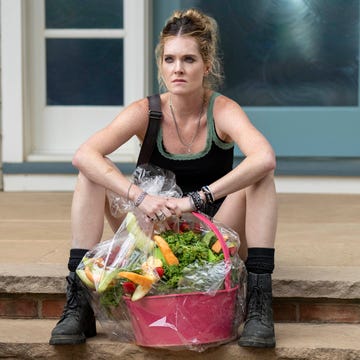Yes, it’s that time again. The kettle’s permanently on, tempers are fraying and your once-reasonable teenager has become a caffeine-fuelled ball of nerves. Exam season is upon us — and with it comes the great parental tightrope walk: supporting without smothering, encouraging without annoying.
So how do you help your child navigate these next few weeks without losing your mind or your relationship? We asked psychologists, nutritionists and parents who’ve been through it all for their best ‘Do’ and ‘Don’t’ advice.
DO… Recognise and understand their anxiety
Natalie Costa, parenting coach and founder of Power Thoughts, suggests resisting the urge to immediately reassure. ‘We think we’re helping when we say, “Don’t worry” or “You’ll be fine,”’ she explains. ‘But what your child actually needs is recognition.’
Try: ‘It makes sense you’re feeling anxious. This matters to you.’ Mirroring their emotions not only helps release the feelgood hormone oxytocin, but offering empathy rather than a fix says: You’re not alone in this. It doesn’t magically remove the stress, but it does make it feel more manageable.
DO… Ask them what they need
‘Parents often think they should have all the answers,’ says psychologist Dr Sandra Wheatley, ‘but you can’t anticipate every need and you might be surprised what children actually want may never have occurred to you.’
Yes, it’s possible they’ll reply with a blank stare. But you might also get an unexpectedly practical answer: a quieter space, fewer interruptions or even a specific snack. Resist the temptation to turn every interaction into a quest for information or a performance review, which teens may see as pressure in disguise, Dr Wheatley adds. Sometimes, the most supportive thing you can do is simply listen — and believe what they tell you.
DO… Be there (even if you’re not doing much)
‘However grown-up and capable your teen seems to be, during intense periods such as GCSEs and A levels, most could do with a bit of additional scaffolding and support,’ advises Good Housekeeping’s health editor and mum of teens, Sarah Maber. ‘Actions such as providing snacks, being a revision sounding board and running a bath before bed may seem small, but they contribute to an overall feeling of safety and a nurturing atmosphere.’
As Dr Wheatley points out, late-night chats — however bleary-eyed — offer an important outlet. ‘It helps if you can guide them to reflect on something positive from the day, even something small,’ she says.
DO… Feed the brain, not just the stress
Tempting as it is to give in to sugar cravings and let them subsist on biscuits and Monster, nutrition plays a quiet but vital role.
‘Having snacks they enjoy isn’t indulging them, it’s part of supporting them,’ says Dr Wheatley. That doesn’t mean that all the rules fly out the window. Pediatric Dietitian Karine Patel recommends oatcakes with hummus, banana with peanut butter, or yogurt with a sprinkle of nuts to maintain energy and focus.
DO… Breakfast like a king
Ditch the sugary cereals, says leading health coach Steve Bennett. He suggests switching to protein-rich breakfasts such as eggs, bacon, or maybe even a breakfast burrito. Preparing a delicious and protein-fuelled breakfast helps them start the day properly – and prevents a sugar crash during revision or morning exams.
DON’T… Value outcome over progress
Yes, you want them to succeed. But now’s the time to celebrate progress over outcome. ‘Say, “I’m proud of how hard you’ve worked,” not just, ‘I’m proud you got an A,”’ says Natalie.
The study period is about growth and resilience, says Natalie, and developing skills they’ll use long after the exam hall is forgotten. It’s important to remind ourselves as well as our teens that ‘the end goal doesn’t mean that you’re good or not good. There are many routes to success and you learn so much more from failure.’
DON’T… Mention the hair. Or the room. Or the hygiene
Stress manifests in different ways. Some teens will clean obsessively; others may stop brushing their hair entirely. Either way, this isn’t the time to launch into hygiene-based criticism.
Try gently offering a bath, or suggesting a walk to get some air; and remind them that caring for themselves will make them feel better — and help them concentrate.
DON’T… Attempt challenging conversations
GH’s Sarah Maber has learnt firsthand that a teen who’s already at capacity with revision commitments will not take kindly to being taken to task for forgetting to contacting Granny on her birthday. However urgent your parental intervention feels at the time, it may well be wiser to wait until after the exam period before tackling it.
DON’T… Force them to take breaks
You know they need fresh air; they know it, too. But the minute you say, ‘Let’s go for a walk’, it becomes a battle.
Instead, Dr Wheatley suggests getting creative. Any way of getting Vitamin D is important; if they don’t want to exercise, suggest breakfast outside or offer a walk to the shop together.
DON’T… Forget the bigger picture
‘This isn’t just about exams,’ says Dr Wheatley. ‘It’s about teaching your child how to cope with pressure, tune into their needs and ask for help.’
You won’t get it right all the time. But if teenagers can exit exams knowing how to steady themselves in the storm (and knowing you’re in their corner), then that’s a result worth celebrating.













